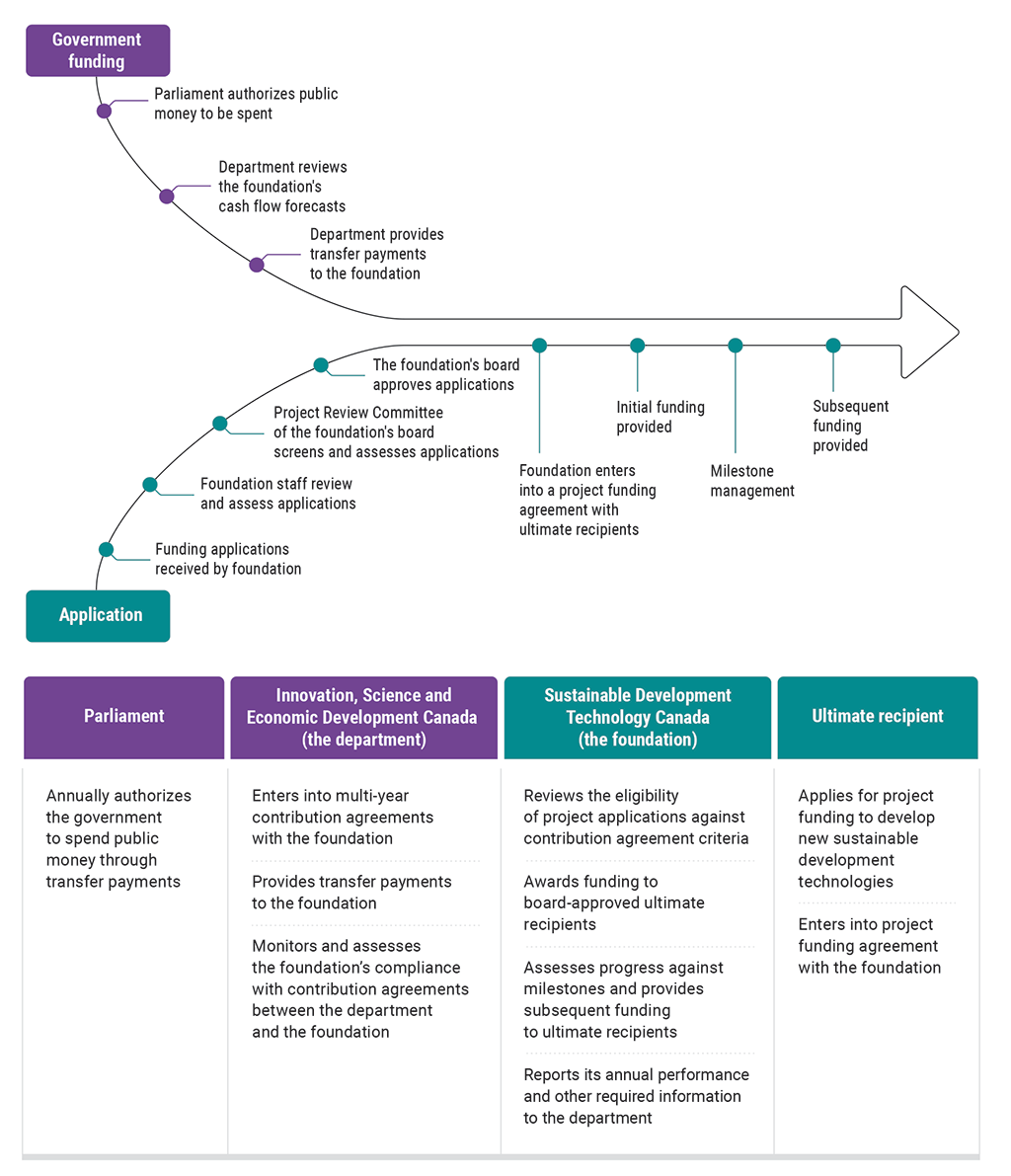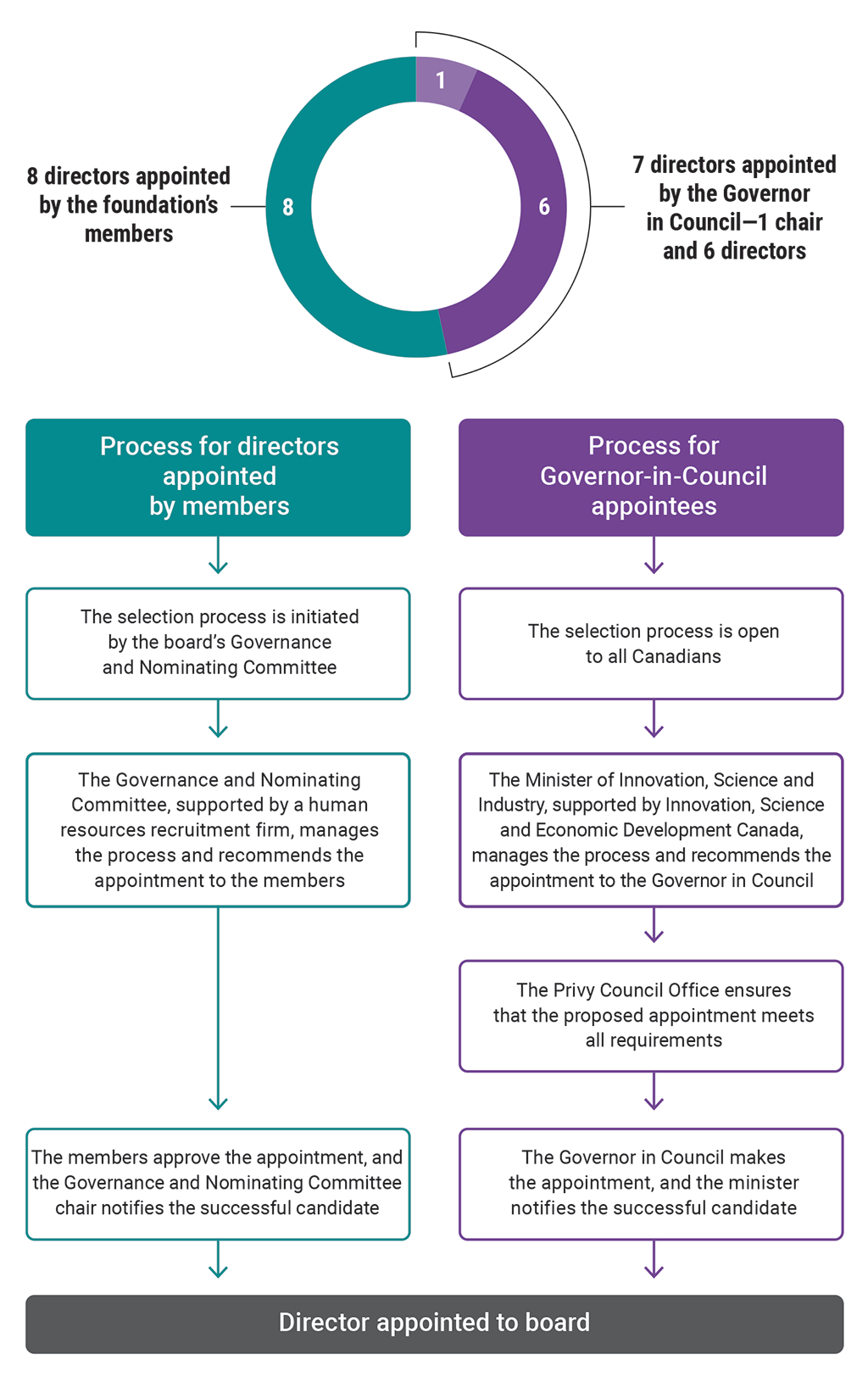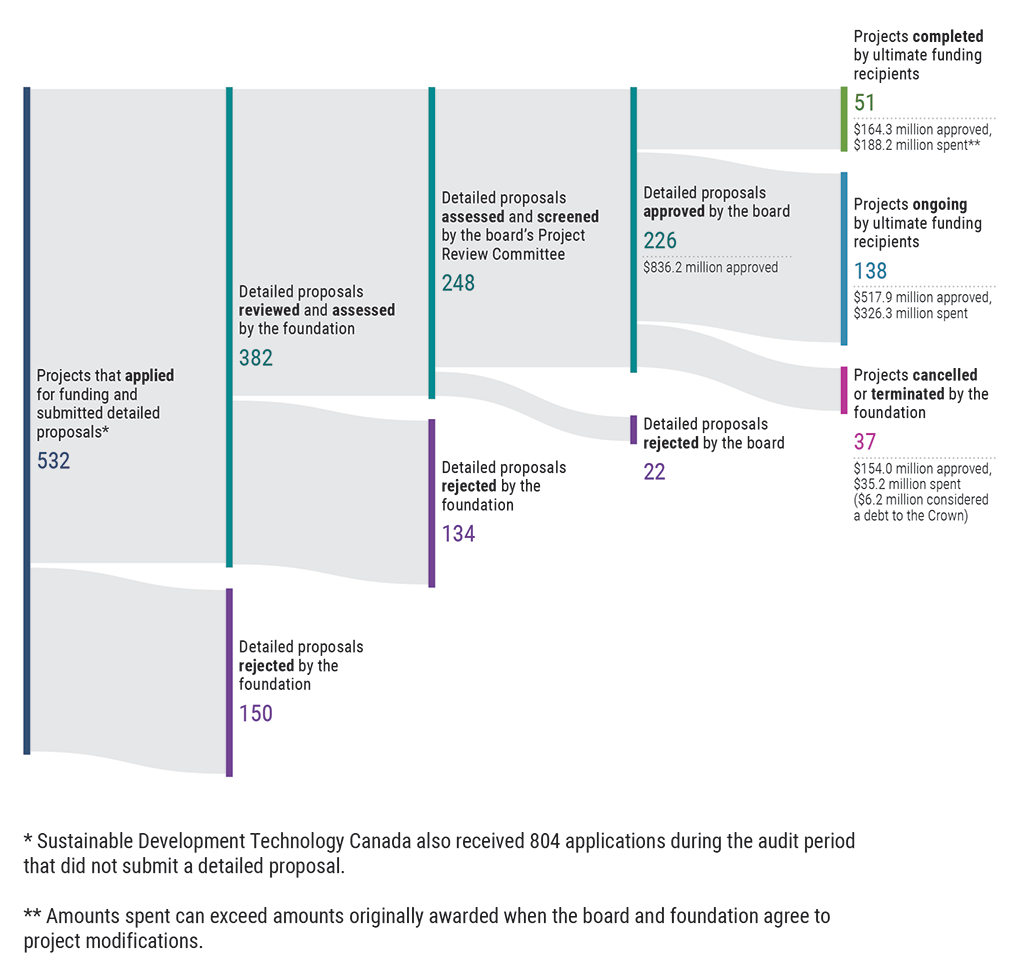2024 Reports 5 to 7 of the Auditor General of Canada to the Parliament of Canada
Report 6—Sustainable Development Technology Canada
At a Glance
Overall, we found significant lapses in Sustainable Development Technology Canada’s governance and stewardship of public funds. The foundation awards funding to support new technologies that promote sustainable development under 4 streams—Start‑up, Scale‑up, Ecosystem, and Seed. For its part, Innovation, Science and Economic Development Canada did not sufficiently monitor the compliance with the contribution agreements between the foundation and the Government of Canada.
We found that the foundation awarded funding to projects that were ineligible, that conflicts of interest existed in some instances, and that certain requirements in the Canada Foundation for Sustainable Development Technology Act were not met.
We found that the foundation awarded funding to 10 ineligible projects of 58 we examined. These 10 projects were awarded $59 million even though they did not meet key requirements set out in the contribution agreements between the government and the foundation. In addition, we estimated that 1 in 10 of the remaining Start‑up and Scale‑up projects approved during our audit period were also ineligible.
Also, according to the minutes of the meetings of the foundation’s board of directors, we found 90 cases that were connected to approval decisions, representing nearly $76 million in funding awarded to projects, where the foundation’s conflict-of-interest policies were not followed.
The board of directors of Sustainable Development Technology Canada did not ensure that the foundation complied with its enabling legislation. The act requires that the foundation have a member council of 15 members. The board of directors supported reducing that number to 2. Members played an important role in representing Canadians and appointing directors to the board to oversee the foundation.
Key facts and findings
- From 1 March 2017 to 31 December 2023, Sustainable Development Technology Canada’s board approved 226 Start‑up, Scale‑up, and Ecosystem projects to receive $836 million.
- Eight Start‑up and Scale‑up projects, totalling $51 million, did not meet eligibility criteria. For example, some projects did not support the development or demonstration of a new technology, or the projected environmental benefits were unreasonable.
- We estimated that 1 in 10 of the remaining 168 Start‑up and Scale‑up projects approved during our audit period, or 16 projects, were ineligible.
- Two Ecosystem projects, totalling $8 million, were ineligible because they did not fund or support the development or demonstration of a new technology.
- The board approved $20 million for Seed projects without completing screening and assessments required by the contribution agreements with the government.
Why we did this audit
- In November 2023, the Office of the Auditor General of Canada decided to conduct an audit to support parliamentarians in their oversight of government activities and the stewardship of public funds.
- To ensure public money is spent in the manner intended, Sustainable Development Technology Canada must monitor the foundation and ensure that it awarded funding in accordance with contribution agreements.
- Sustainable Development Technology Canada is entirely funded through public money. With that comes an expectation that it holds the highest standards for ethical practices. Conflicts of interest that are not disclosed or managed call into question the objectivity and impartiality of the foundation and its decisions.
Highlights of our recommendations
- Building on a recommendation made in 2017 by the Commissioner of the Environment and Sustainable Development, Sustainable Development Technology Canada should improve its challenge function over projected sustainable development and environmental benefits.
- Sustainable Development Technology Canada should reassess projects approved during the audit period to ensure that they met the goal and objectives of the Sustainable Development Technology Fund and all its eligibility criteria.
- Sustainable Development Technology Canada should implement an effective system to receive, manage, store, and report annually disclosures of conflicts of interest and put measures in place to ensure its conflict-of-interest policies are followed.
Please see the full report to read our complete findings, analysis, recommendations and the audited organizations’ responses.
Exhibit highlights
Funding process for most applications to the Sustainable Development Technology Fund

Source: Based on the contribution agreements between Innovation, Science and Economic Development Canada and Sustainable Development Technology Canada
Text version
This flow chart shows how the federal government funds most applications to the Sustainable Development Technology Fund.
Government funding
Government funding involves Parliament and Innovation, Science and Economic Development Canada.
Parliament annually authorizes the government to spend public money through transfer payments.
Innovation, Science and Economic Development Canada enters into multi-year contribution agreements with the foundation Sustainable Development Technology Canada, provides transfer payments to the foundation, and monitors and assesses the foundation’s compliance with contribution agreements between the department and the foundation.
The government funding process to provide contributions to the foundation is as follows:
- Parliament authorizes public money to be spent.
- The department reviews the foundation's cash flow forecasts.
- The department provides transfer payments to the foundation.
Application
The application process involves Sustainable Development Technology Canada and ultimate recipients.
The foundation reviews the eligibility of project applications against contribution agreement criteria, awards funding to board-approved ultimate recipients, assesses progress against milestones and provides subsequent funding to ultimate recipients, and reports its annual performance and other required information to the department.
An ultimate recipient applies for project funding to develop new sustainable development technologies and enters into a project funding agreement with the foundation.
The process for most applications to the foundation is as follows:
- Funding applications are received by the foundation.
- Foundation staff review and assess applications.
- The Project Review Committee of the foundation's board screens and assesses applications.
- The foundation's board approves applications.
- The foundation enters into a project funding agreement with ultimate recipients.
- Initial funding is provided.
- Milestones are managed.
- Subsequent funding is provided.
Process to appoint directors to the board of Sustainable Development Technology Canada (the foundation)

Source: Sustainable Development Technology Canada and the federal government website for Governor‑in‑Council appointments
Text version
This flow chart shows the 2 ways that directors can be appointed to the board of the foundation Sustainable Development Technology Canada.
Eight directors are appointed by the foundation’s members. Seven directors are appointed by the Governor in Council—1 chair and 6 directors.
Process for directors appointed by members
- The selection process is initiated by the board’s Governance and Nominating Committee.
- The Governance and Nominating Committee, supported by a human resources recruitment firm, manages the process and recommends the appointment to the members.
- The members approve the appointment, and the Governance and Nominating Committee chair notifies the successful candidate.
- The director is appointed to the board.
Process for Governor-in-Council appointees
- The selection process is open to all Canadians.
- The Minister of Innovation, Science and Industry, supported by Innovation, Science and Economic Development Canada, manages the process and recommends the appointment to the Governor in Council.
- The Privy Council Office ensures that the proposed appointment meets all requirements.
- The Governor in Council makes the appointment, and the minister notifies the successful candidate.
- The director is appointed to the board.
Results of applications to the Start‑up, Scale‑up, and Ecosystem streams of Sustainable Development Technology Canada (the foundation), 1 March 2017 to 31 December 2023

Source: Based on Sustainable Development Technology Canada’s project database
Text version
This diagram shows the results of the applications to 3 streams of the foundation Sustainable Development Technology Canada for the period from 1 March 2017 to 31 December 2023.
During the period, there were 532 projects that applied for funding and submitted detailed proposals. Sustainable Development Technology Canada also received 804 applications during the audit period that did not submit a detailed proposal.
Of the 532 detailed proposals that were submitted, 150 were rejected by the foundation.
The remaining 382 detailed proposals that were submitted were reviewed and assessed by the foundation.
Of the 382 detailed proposals that were reviewed and assessed, 134 were rejected by the foundation.
The remaining 248 detailed proposals that were reviewed and assessed were assessed and screened by the board’s Project Review Committee.
Of the 248 detailed proposals that were assessed and screened, 22 were rejected by the board.
The remaining 226 detailed proposals that were assessed and screened were approved by the board. There was $836.2 million approved.
The 226 detailed proposals that were approved by the board can be broken down as follows:
- There were 51 projects completed by ultimate funding recipients. There was $164.3 million approved and $188.2 million spent. Amounts spent can exceed amounts originally awarded when the board and foundation agree to project modifications.
- There were 138 projects ongoing by ultimate funding recipients. There was $517.9 million approved and $326.3 million spent.
- There were 37 projects cancelled or terminated by the foundation. There was $154.0 million approved and $35.2 million spent ($6.2 million considered a debt to the Crown).
Related information
Entities
Tabling date
- 4 June 2024
Related audits
- 2017 Reports of the Commissioner of the Environment and Sustainable Development
Report 3—Funding Clean Energy Technologies - 2006 Reports of the Commissioner of the Environment and Sustainable Development
Chapter 1—Managing the Federal Approach to Climate Change
Parliamentary hearings
